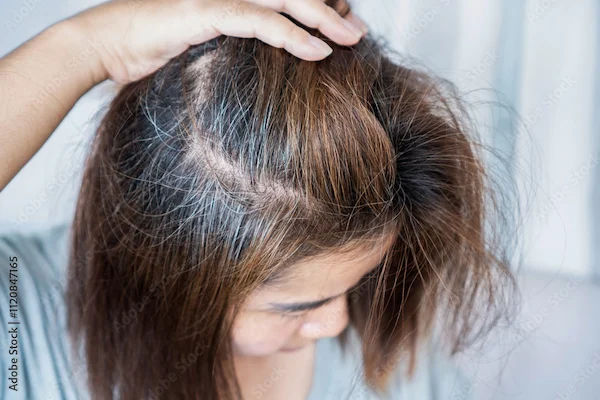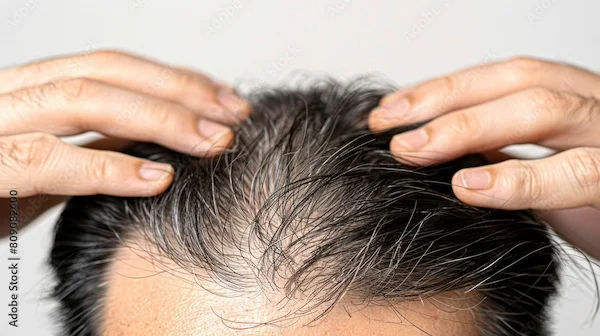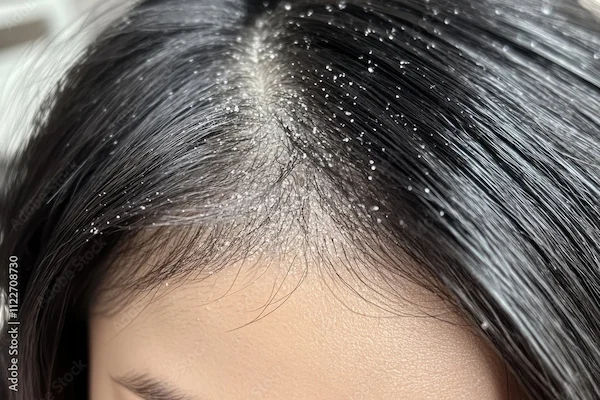How to Reduce Oily Scalp?
Learn effective ways to reduce an oily scalp. Discover hair care tips, natural remedies, and lifestyle changes for healthier hair.

Written by Dr. Sonia Bhatt
Last updated on 3rd Jul, 2025

Introduction
An oily scalp can make your hair appear greasy, heavy, and limp, which can be frustrating. Whether caused by hormones, genetics, or environmental factors, excess sebum (oil) on the scalp is a common issue. However, with the right approach, you can reduce an oily scalp and maintain healthier, fresher hair. In this guide, we'll explore the causes of oily scalp and provide practical tips, natural remedies, and expert advice on how to effectively manage and reduce it.
Understanding the Causes of Oily Scalp
Before diving into solutions, it’s essential to understand the underlying causes of an oily scalp. Oil is naturally produced by sebaceous glands in the scalp to keep hair moisturised and protected. However, when these glands produce excess oil, it leads to an oily scalp. Here are the main causes of oily scalp:
Hormonal Fluctuations: Hormones play a significant role in oil production. During puberty, pregnancy, menstruation, or conditions like polycystic ovary syndrome (PCOS), the body experiences hormonal changes that trigger increased sebum production.
Genetics: If your parents have an oily scalp or skin, you may be genetically predisposed to an oilier scalp. Sebaceous glands can be more active in some individuals due to their genetic makeup.
Diet and Lifestyle: Diets high in sugar, processed foods, and dairy can contribute to an oily scalp. These foods may affect your hormone levels, which in turn influence sebum production. On the other hand, a balanced diet with fresh fruits, vegetables, and healthy fats can help regulate oil production.
Environmental Factors: Humidity, heat, and pollution can trigger increased oil production. The warm summer months, for instance, can make the scalp produce more oil due to sweat and moisture, as highlighted by Head & Shoulders.
Hair Care Habits: Over-washing or under-washing your hair can exacerbate oiliness. Over-washing strips the scalp of natural oils, causing it to overcompensate and produce more oil. Washing too infrequently leads to a buildup of oil and debris on the scalp.
Consult Top Dermatologist
Understanding these causes is the first step in choosing the right solution for managing oily scalp.
1. Shampooing Techniques and Product Selection
Choosing the right shampoo and maintaining a proper washing routine is one of the most effective ways to control oil buildup on the scalp.
Wash Regularly, But Not Excessively: Over-washing can strip away natural oils, which leads to an overproduction of sebum. Healthline recommends washing your hair every other day or two to three times a week, depending on your hair type and oil levels. This balance helps maintain a healthy scalp without triggering more oil production.
Choose the Right Shampoo: For an oily scalp, opt for a gentle, sulphate-free shampoo specifically formulated for oily hair. Look for ingredients like salicylic acid, which helps exfoliate the scalp and remove excess oil. Tea tree oil is another great option known for its oil-controlling and antimicrobial properties. Avoid shampoos with heavy moisturisers or oils that can weigh down your hair.
2. Natural Remedies
Natural remedies can be a great addition to your hair care routine to help balance your scalp’s oil production. Here are some of the best home remedies for managing an oily scalp:
Apple Cider Vinegar (ACV): Apple cider vinegar is a natural astringent that helps balance your scalp’s pH and control oil production. Mix 1–2 tablespoons of ACV with one cup of water and use it as a final rinse after shampooing. It also helps remove product buildup, leaving your scalp refreshed.
Tea Tree Oil: Tea tree oil has antibacterial and antifungal properties that help reduce excess sebum and prevent scalp infections. You can add a few drops of tea tree oil to your regular shampoo or mix it with a carrier oil (such as coconut oil) and massage it into your scalp for 5–10 minutes before washing.
Aloe Vera: Aloe vera is known for its soothing and anti-inflammatory properties. It helps calm the scalp while controlling oiliness. Aloe vera gel can be applied directly to the scalp or mixed with other oils for an added benefit.
These remedies can help maintain a healthy scalp without causing dryness or irritation, making them perfect for long-term use.
3. Exfoliating and Scalp Care
Exfoliating your scalp can help remove dead skin cells, oil, and product buildup, preventing clogged pores and excessive oil production.
Scalp Exfoliation: Regular scalp exfoliation is key to keeping your scalp clean and oil-free. Gently scrub your scalp using a natural exfoliator like sugar or sea salt. You can mix these with your regular shampoo for a simple DIY scrub. Refresh Scalp Care recommends exfoliating once a week to remove buildup and ensure your scalp remains clear.
Scalp Massages: Massaging your scalp not only increases blood circulation but also helps distribute oils more evenly throughout your hair. It prevents excess oil from accumulating in one area, and it can also help to clear away dead skin cells and debris. A gentle massage while shampooing or applying oils can benefit both your scalp and hair health.
4. Using Dry Shampoo for Immediate Relief
If you’re in a rush or need to refresh your hair between washes, dry shampoo can be a game-changer. It helps absorb excess oil and gives your hair a fresh look without the need for a full wash.
Dry Shampoo: This product absorbs oil from the scalp, leaving your hair looking less greasy and more voluminous. Use dry shampoo sparingly—focus on the oilier areas of your scalp and brush out any excess product. It’s a quick fix, but it shouldn’t replace regular washing.
5. Avoiding Certain Habits and Products
Some daily habits and hair products may be contributing to an oily scalp without you realising it. Here are some things to avoid:
Avoid Touching Your Hair: Constantly touching your hair transfers oil from your fingers to your scalp, making it oilier faster. Try to avoid running your fingers through your hair during the day.
Limit the Use of Hair Accessories: Wearing hats, tight headbands, or other accessories can trap oil and sweat on your scalp. This makes it easier for oil to accumulate, especially during the warmer months when the scalp produces more oil due to heat and sweat.
6. Lifestyle Changes
Your diet and overall lifestyle also play a significant role in oil production. Making small changes in your diet and daily habits can help keep oil levels in check.
Diet: A diet high in processed foods, sugar, and dairy can contribute to excess oil. To manage your scalp’s oil production, focus on eating a balanced diet rich in fresh vegetables, fruits, lean proteins, and healthy fats like omega-3s found in fish, flaxseeds, and walnuts. Staying hydrated by drinking plenty of water is also essential for maintaining a healthy scalp.
Stress Management: Stress can increase cortisol, which may lead to increased oil production. To manage stress, try relaxation techniques into your routine such as yoga, meditation, or simply taking time for self-care.
7. When to Seek Medical Help
While most cases of oily scalp can be managed with the above strategies, persistent or severe oiliness may indicate an underlying medical issue, such as seborrheic dermatitis or fungal infections. If you experience hair thinning, dandruff, redness, or irritation, it’s important to consult a dermatologist. They may recommend specialised treatments, such as prescription shampoos or topical solutions to address the problem.
Conclusion
An oily scalp doesn’t have to be a major concern. By understanding the causes and implementing the right combination of hair care products, natural remedies, lifestyle adjustments, and professional treatments, you can successfully manage and reduce oil buildup. Remember, consistency is key—stick with a routine, be patient, and soon you’ll enjoy a healthier, oil-free scalp and fresh, voluminous hair.
Consult Top Dermatologist
Consult Top Dermatologist

Dr. K Chetana
Dermatologist
10 Years • MBBS, MD ( Dermatology)
Hyderabad
Apollo 24|7 Clinic, Hyderabad

Dr. Hemalatha Naidu M
Dermatologist
5 Years • MBBS, MD (Dermatology)
Bangalore
Apollo 24|7 Clinic - Karnataka, Bangalore
(275+ Patients)

Dr Usha B K
Dermatologist
4 Years • MBBS,MD (Dermatology, Venereology & Leprosy), DNB (Dermatology, Venereology & Leprosy), Fellowship in Trichology
Bangalore
Apollo 24|7 Clinic - Karnataka, Bangalore
(50+ Patients)

Dr. Jyotirmay Bharti
Dermatologist
15 Years • MBBS, DDV
Gurugram
SQUARE ROOTS- HAIR, SKIN AND LASER CLINIC, Gurugram
Dr. Kavitha Killaparthy
Dermatologist
23 Years • MBBS,DIPLOMA(DERMATOLOGY,VENEREOLOGY,LEPROSY)
Hyderabad
JDS Skin & Hair Clinic, Hyderabad
Consult Top Dermatologist

Dr. K Chetana
Dermatologist
10 Years • MBBS, MD ( Dermatology)
Hyderabad
Apollo 24|7 Clinic, Hyderabad

Dr. Hemalatha Naidu M
Dermatologist
5 Years • MBBS, MD (Dermatology)
Bangalore
Apollo 24|7 Clinic - Karnataka, Bangalore
(275+ Patients)

Dr Usha B K
Dermatologist
4 Years • MBBS,MD (Dermatology, Venereology & Leprosy), DNB (Dermatology, Venereology & Leprosy), Fellowship in Trichology
Bangalore
Apollo 24|7 Clinic - Karnataka, Bangalore
(50+ Patients)

Dr. Jyotirmay Bharti
Dermatologist
15 Years • MBBS, DDV
Gurugram
SQUARE ROOTS- HAIR, SKIN AND LASER CLINIC, Gurugram
Dr. Kavitha Killaparthy
Dermatologist
23 Years • MBBS,DIPLOMA(DERMATOLOGY,VENEREOLOGY,LEPROSY)
Hyderabad
JDS Skin & Hair Clinic, Hyderabad


